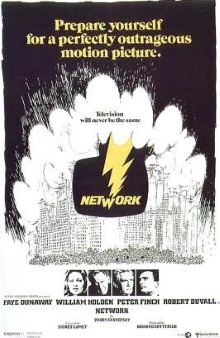
If you’re anything like me, this film’s title is a subject of some confusion. After all, today when we think of the word ‘network’, we think in terms of computer and communications networks. The last thing that would come to mind is a television network. Yet this is indeed what it’s about and it turns out to be an impressively prescient film by Sidney Lumet who once again blows me away with his acute sense of insightful social commentary.
Following the announcement that he will soon be taken off the air due to poor ratings, long-time news anchor Howard Beale becomes unhinged and depressive. When he announces on air that he is going to commit suicide on live television, the network tries to fire him. His superior and friend Max Schumacher however wants to give him a chance to say goodbye in a dignified manner. Howard uses this occasion to rant about how life is full of bullshit. This strikes a chord in viewers and drives up his ratings. The head of programming Diana Christensen sees an opportunity here and gains control of the news program. She reframes Howard as the ‘mad prophet of the airwaves’ and includes such figures as fortune tellers as part of the news. She goes even further and creates a show that uses authentic videos of the exploits of a Communist domestic terrorist group. This is hugely popular and helps the ailing network to turn around its fortunes. But then Howard learns that the network is about to be bought by a Saudi Arabian corporation and makes that his next target. This upsets his corporate masters and gains the personal attention of Arthur Jensen, the company’s chairman.
It’s pretty hard to categorize Network into any given genre. I guess the closest you could come is a very dark comedy. The film is positively bursting at the seams with all manner of social commentary and the wonder of it is how far ahead it was of its time. For example, Howard’s signature “I’m as mad as hell, and I’m not going to take this anymore!” line is a fantastic example of a meme. In general, its theme of how television reaches ever harder in search of authenticity and to move a jaded audience, yet how its commercialism and the fickleness of the audience’s attention ultimately corrupts the original authenticity is precisely the content of my of my favorite Black Mirror episodes. Though Lumet screenwriter Paddy Chayefsky directed their satire against television, one can easily see how all this applies even better towards YouTube and modern social media content. Then there’s the bit about how Howard riles up his audience until they froth with inarticulate rage and directs them against enemies. That’s as strikingly prescient a portrait of Trump-era politics as anything else I’ve seen.
Some critics seem to dislike how it’s full of demagoguery diatribes but as I love the occasional good rant, I’m fine with that. In fact, I very much love the colorful language this film throws around. At one point Max and Diana talk about the former’s cocksmanship and Arthur Jensen’s warning about how Howard has dabbled with the primal powers is thing of pure beauty. I also appreciate that while the film has clear point that it’s driving towards, it allows in some doubt as to how crazy Howard really is or how far the network will let him go. The relationship between Max and Diana seems at first like a sub-plot that goes in a tangential direction but turns out by the end to be another way to expose the emptiness of Diana’s worldview. Finally the ending just kills me. I particularly love the reaction of the executive who commented that the network can’t be implicated and who earlier felt that he had to make a token protest. He’s a dead ringer for Senator John McCain’s role in US politics today!
So yes, I find Network to be absolutely delightful and I think it has that little bit of extra resonance to me due to my own, sadly neglected, background in journalism. Its humor and social critique is still relevant even forty years on, its presentation surpassing even the quality of more modern efforts. So far all three of the Lumet we’ve watched have been fantastic and all have involved insightful social commentary. Needless to say, I have been busy perusing this under-appreciated director’s filmography and adding titles to my watch list.